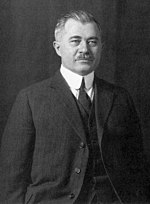József Galamb, Date of Birth, Place of Birth, Date of Death
TweetJózsef Galamb
Hungarian mechanical engineerAbout József Galamb
- József Galamb (English: Joseph A.
- Galamb) (3 February 1881 – 4 December 1955) was a Hungarian-American mechanical engineer.
- most known for model T. Galamb finished his education at the Budapest Industrial Technology Engineering Course (the predecessor of the present-day Óbuda University Bánki Donát Politechnical College) in 1899.
- After receiving his diploma in mechanical engineering he worked at the Steel Engineering Factory in Diósgyor as a draftsman.
- He next served one year in military service.
- He worked at the Hungarian Automobile Co., where he won a postgraduate scholarship to Germany.
- After the navy he went to see the world — Vienna, Dresden, Berlin, Hamburg and Bremen.
- In 1903 he worked in many German cities as a skilled worker, he got the best education at Adler in Frankfurt.
- He was hired to assemble automotive engines in a process in which each engine was built completely by one man.
- When he learned of the 1904 American Auto World Fair in St.
- Louis, he used his savings to travel to America by ship in October 1903.
- After two months in New York, he found employment as a toolmaker at the Westinghouse Corporation in Pittsburgh.
- Although he planned to go back to Germany in 1904, instead he joined the Stearns Automobile Company in Cleveland as a carburetor maker.Galamb applied for work at the Silent Northern plant, the reorganized Ford-Cadillac plant and the Ford Piquette Avenue Plant.
- All three offered him work within three hours.
- He joined the Ford Motor Company (twenty-four years old at that time) as a designer in December 1905.
- The Ford Motor Company had 300 employees at the time assembling the Ford Model A from purchased parts.
- Subsequent to redesigning the cooling system for the Model N, he became the chief designer of the company, and devised many of the parts of the famous Model T.
- From 1915 he worked on the Fordson tractor design.
- In 1921 he founded a scholarship for the poor students of his native town who wished to take up higher education at trade school.
- During World War I he was busy designing military hardware, e.
- g.
- anti-submarine detection systems.
- He visited Hungary many times, lecturing at the Association of Hungarian Engineers and Architects.
- During World War II on Ford's suggestion, he designed a small six-cylinder car, which was completed in 1942.
- On doctor's orders he retired from active work in 1944. His influence played a role in the Ford V8 and Eifel being assembled in Hungary from 1935.
- He died in 1955 in Detroit.
Read more at Wikipedia


 Date of Birth:
Date of Birth:  Place of Birth: Makó, Csongrád County, Hungary
Place of Birth: Makó, Csongrád County, Hungary